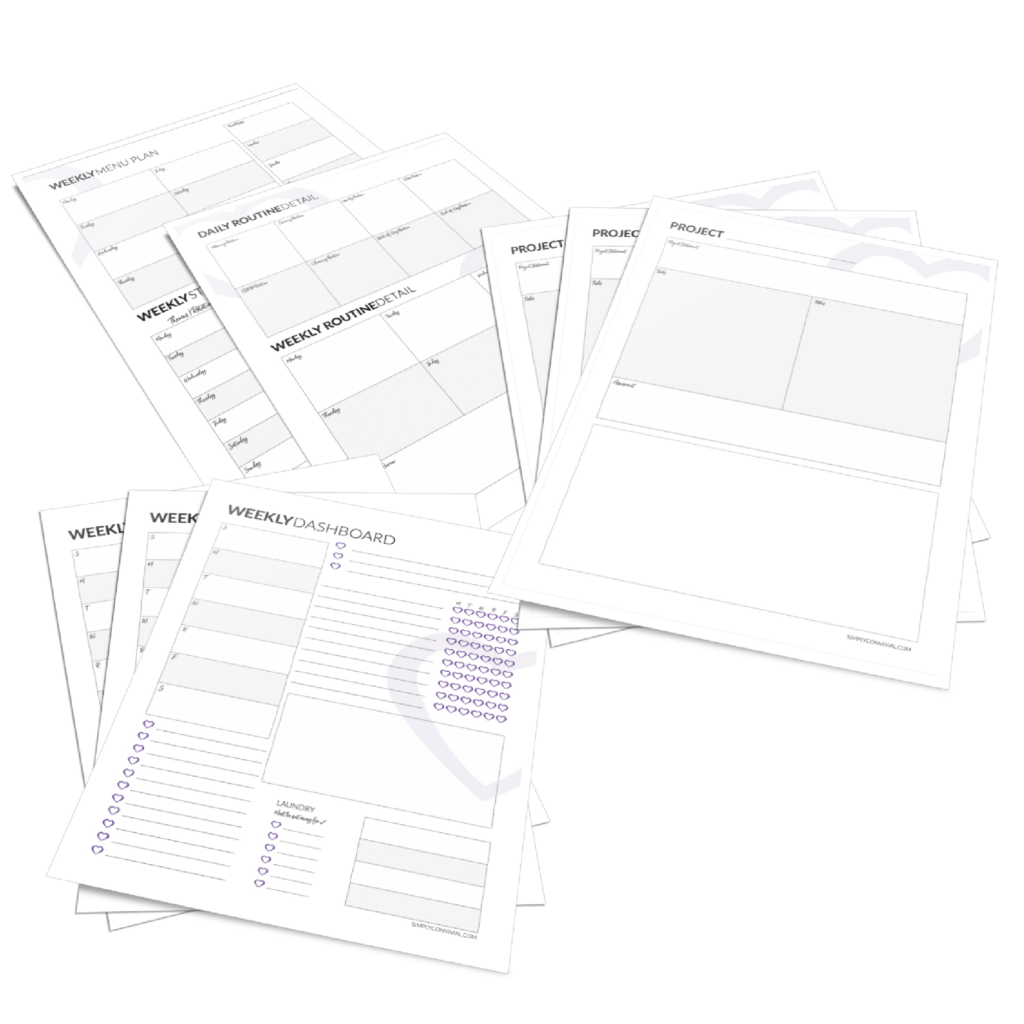We really must begin with organizing our attitude before we organize anything else.
We might think that making a plan and working a plan is all about the planner, the app, the method, but the truth is that how we think about our planning going into it matters tremendously.
I remember very vividly being struck by a line of poetry once quoted by a mentor of mine:
“Dreaming of systems so perfect that no one will need to be good.”
I wasn’t ready for that when I heard it first. What I really, really wanted was a system so perfect that I wouldn’t have to expend any effort at all, I could just hum along doing whatever I wanted and everything would just work out.
Turns out life doesn’t work that way.
That line haunted me and was there when I needed it.
The problem isn’t with setting up systems. Systems can help us reduce decision fatigue so we don’t get so worn out by the dailiness of life. What is a problem is the search for a system that will make life easy.
I do not have a system that will make life easy, because that’s not the goal in life.
God’s goal for our lives is our sanctification. That’s not an easy road. But it is a good one. And if our eyes and our aims are fixed on growth rather than checkmarks, on building rather than on success, then our attitudes will be aligned with reality, the reality that God doesn’t let us control our outcomes. But He does call us to faithful obedience and stewardship.
Therefore, our purpose in learning to make better plans and work them out more effectively is to serve well, not to prove ourselves.
Listen to this post!
Dreaming of Perfect Systems
The reason we care about planning at all is that we want to fulfill the responsibilities God has given us. We want to be ready and willing to meet the good works God has laid out for us to do, and then, as Paul writes, do so more and more.
We have to shift our mindset about planning from one that seeks control to one that seeks faithfulness. Proper productivity comes from engagement, not control.
Too much of our planning comes from a desire to control the outcome, to get what we want, to be in charge. But if we want it to be truly effective, our planning needs to be about being prepared and ready, not about being in control.
Because, of course, we aren’t in control. God is. And we can trust Him. He will throw things our way that we don’t expect. Sometimes we will immediately see how what He has is better than what we were planning, but most of the time what He sends looks like trouble and problems and even disaster.
But responding in faith is seeing that nothing comes from chance but from His fatherly hand, so we can move forward whatever comes knowing that His hand is in it and that there is a path of faithful obedience in front of us. That’s what matters: following the path of faithfulness, wherever that path winds and twists.
In order to keep our attitudes organized and aligned with truth, we must also aim for incremental change, focusing on process rather than results.
Rather than aiming at results and objectives, we need to focus on direction. The pace we are going is much less important than the direction we’re heading. That we are making forward progress matters more than reaching predetermined milestones and objectives, much less finish lines. Truly, there are very few finish lines in the roles that matter most to us.
Because, when we think of our plans and our goals in terms of fulfilling our vocations, we won’t have an end point until God shifts our calling or our lives are over. It’s not projects themselves that matter so much as serving to the best of our ability where we are right now. Noticing what’s in front of us and moving forward from there.
So a lot of our life is going to center around repetition, around practicing, around putting in the reps. That’s how we make incremental progress forward in the direction we aim.
Practice makes perfect, we hear. That’s not true. Neither our systems nor we will ever arrive at perfect. However, practice makes progress, practice makes prompt, and practice makes pleasant
Practice makes progress.
It moves us forward. We get better at our habits, we get better at our jobs. Intentional, deliberate practice – repeating the same thing over and over again – is how we get better at anything.
So let’s continue to practice rather than hope to arrive.
Practice makes prompt.
The more we practice an action, the easier it becomes. So let’s practice those things we want to make easier. Let’s make smiling in our children’s eyes a habit. Let’s make getting a load of laundry started before breakfast a habit.
Those little actions that you practice again and again, become easier and easier, more and more automatic, the more you do practice them. And the goal is not to practice them until you don’t have to anymore. We’ll be starting loads of laundry until we are bedridden and someone else does it for us.
The point of practicing to promptness is so that we can take care of our little responsibilities without taxing our minds and our willpower.
Practice makes pleasant.
This seems odd and unlikely until you experience it enough times to simply know it’s true. A repeated behavior becomes a pleasant behavior after it’s ingrained. You might think, “I could never love doing laundry.” But try starting a load every single day before breakfast and folding it while listening to an audiobook every afternoon.
As those actions become habits in your life, you’ll grow fond of their place in your routine and you will dread laundry less and less as it becomes simply a small bit of your daily process, especially as you find how pleasant it is to keep on top of your responsibilities, little step by little step.
Practice does not make perfect. However, practice makes progress. Practice makes prompt, practice makes pleasant.
Putting in the effort to set up a system that guides you toward intentionality, towards making good decisions about what to do next, towards learning and practicing good choices, will pay off.










2 Comments